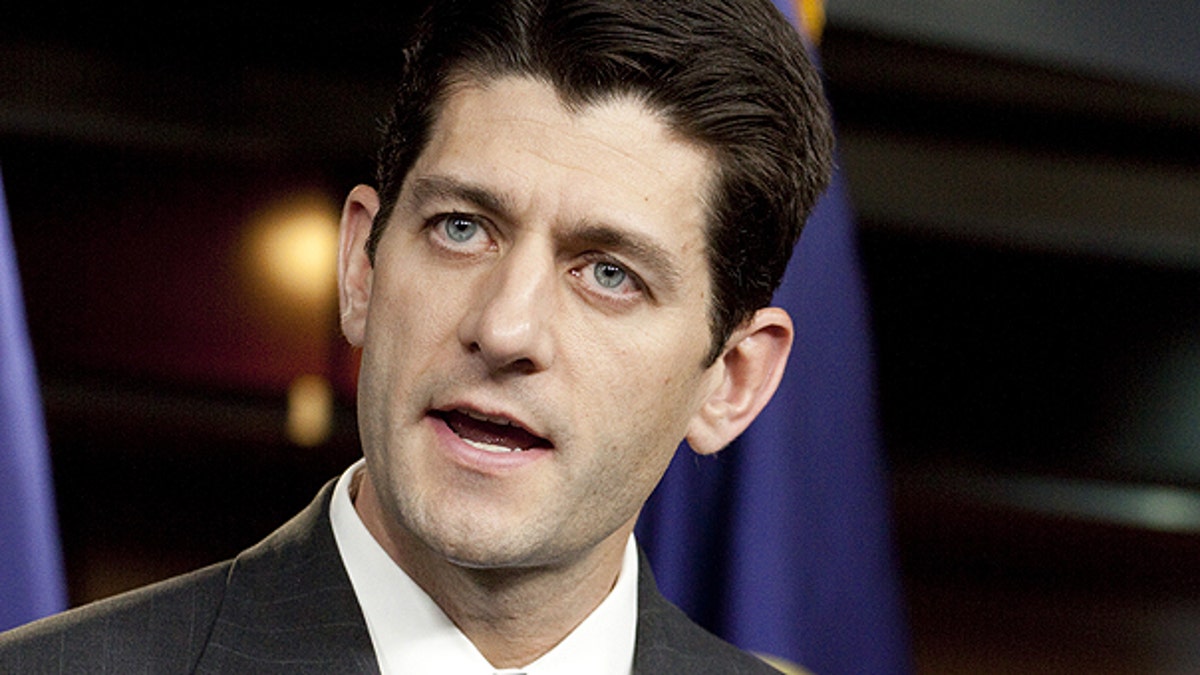
April 15, 2010: Rep. Paul Ryan, R-Wis., chairman of the House Budget Committee, speaks on Capitol Hill. (Reuters)
Sometimes it seems like Rep. Paul Ryan (R-Wis.) is the only person in Washington, D.C., who sees the elephant in the room.
That’s not true, of course. Everyone in Washington knows that without significant changes to Medicare, Medicaid and Social Security -- collectively known as entitlement programs -- the U.S. will never bring under control its spiraling deficit.
What separates Ryan, chairman of the House Budget Committee, from nearly all of his Congressional peers is his willingness to take an actual position on entitlement reform, to put forth specific, concrete proposals designed to lower the cost of Medicare, for instance, rather than merely spout platitudes and pander to voters.
“Entitlements are the number one issue when it comes to reining in government spending. That’s why I love Ryan. He’s out there talking about this. Other politicians don’t have the moral fortitude that will allow them to do that,” said Richard Zuendt, a conservative political activist in New Jersey.
[pullquote]
The crux of Ryan’s reform concept is to scale back Medicare spending through “premium supports,” which inject price competition into the system by giving seniors the option of either buying health insurance in the private marketplace using government subsidies (vouchers), or staying with their current Medicare coverage at a reduced price.
Last year Ryan took his first serious stab at Medicare reform and quickly learned why most of his fellow elected officials in Washington either avoid the issue altogether or dance around it like an undetonated landmine.
Ryan’s first effort would have completely privatized Medicare, turning it into a voucher-like system subsidized by the government but which allowed elderly Americans to choose their health care coverage from a list of government-approved options.
The criticism of that plan was that annual increases in government subsidies were capped at the rate of inflation (generally around 2% or 3% in recent years) while Medicare costs actually rise at about 8% each year. The money to cover the difference would have to come out of seniors’ pockets.
That didn’t go over very well.
Seniors of all political persuasions were angry and the dispute opened the door for critics to brand Ryan and his fellow Republicans as unsympathetic to the plight of the elderly and the poor. Democrats seized on the issue and credited the Medicare reform proposal with an upset win last May in an otherwise obscure Congressional election in an overwhelmingly conservative district in western New York.
Given how the issue was used to polarize the electorate, it’s surprising any elected official has taken up its mantle again.
Nevertheless, chastened but apparently undeterred, Ryan tried again in December, releasing a plan he co-authored with Senator Ron Wyden, a Democrat of Oregon. This time seniors would still get a government subsidy to choose a private plan, but if they preferred they could keep their old Medicare plan. To cover cost gaps in Ryan’s earlier proposal, Ryan and Wyden increased the government’s contribution to the Medicare budget.
The updated version, widely referred to as Ryan 2.0, revived the argument, but not for long.
Then, on Tuesday, Ryan introduced a sweeping 2013 budget proposal that includes his latest overhaul of Medicare. The new blueprint is essentially a slightly reformed version of Ryan’s earlier reform efforts, offering tweaks to the Ryan-Wyden plan, namely a competitive bidding element that would determine the size of the government’s subsidies.
In addition, Ryan’s newest plan would block grant all federal Medicare entitlements to the states, another effort to control spending increases.
The response has been predictable. Democrats have pulled out last year’s scare tactics, while many Republicans with tea party inclinations say the plan doesn’t cut enough fast enough.
Neither group has offered a viable competing plan, however.
Typical of how elected officials in Washington like to talk tough about entitlement reform without really saying anything was the response from the Blue Dog Coalition, a group of fiscally conservative Congressional Democrats, who described themselves as “frustrated” that neither Ryan nor President Obama has offered “bold, substantive solutions that address our long-term debt crisis.”
Have the Blue Dogs?
The Blue Dogs throw in a bit of their own pandering, saying Ryan’s plan “turns Medicare into a voucher system increasing costs for seniors.”
Meanwhile, many mainstream Republicans are supporting Ryan, happy in an election year to allow him to act as point man on an unpopular issue. With Ryan as the face of specific Medicare reform, other Republicans can at least claim to be behind a serious effort to cut government spending and reduce the budget.
Peter Ferrara, director of entitlement and budget policy for the Heartland Institute, a free-markets policy center in Chicago, said Ryan’s proposals aren’t really new, they simply extend policies already in place with Medicare Parts C and D to areas of the program where they aren’t used.
“It shouldn’t even be controversial. A lot of people raising the criticism don’t understand the policies. Criticism from other areas is based on dishonest manipulation of the public,” Ferrara said.
Opportunistic supporters (and detractors, for that matter) of Ryan’s plan may one day regret hiding behind him during an election year, using him for political coverage. When the day eventually arrives that entitlement reform becomes a reality, Ryan is likely to be hailed as a courageous visionary.
Zuendt said politicians should start looking past the next election and get on board with Ryan.
“They should be joining a chorus in support of this issue. They shouldn’t be allowing Ryan to sing solo anymore,” he said.




